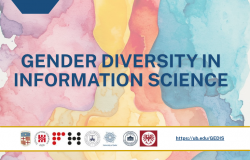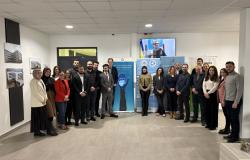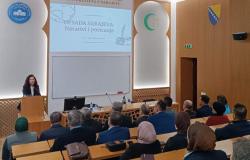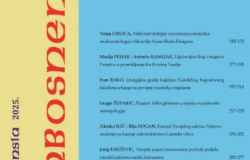Konferencija IDESA 2022 | INFORMACIJSKA PISMENOST I CIVILNO DRUŠTVO: Koncepti poučavanja i evaluacija u informacijskom neredu
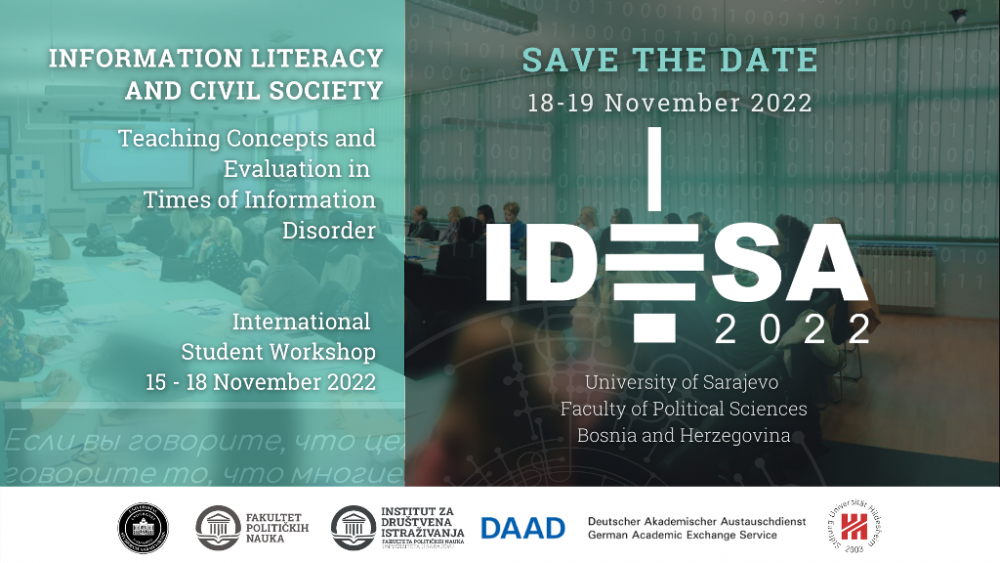
Nakon dvije održane IDESA konferencije koje su u fokusu imale informacijsku pismenost za građanski razvoj i perspektive MIP obrazovanja, ovogodišnja hibridna (online) konferencija IDESA održat će se 18. i 19. novembra 2022. u Sarajevu / Univerzitet u Sarajevu – Fakultet političkih nauka.
Konferencija IDESA 2022 – INFORMACIJSKA PISMENOST I CIVILNO DRUŠTVO: Koncepti poučavanja i evaluacija u informacijskom neredu, fokusirat će se na različite procese učenja i nastavne prakse kako bi se predstavile strategije za upravljanje informacijskim zagađenjem.
Tema ovogodišnje IDESA konferencije ima za cilj otvoriti diskusije o informacijskoj pismenosti i potaknuti propitivanja je li tehnologija problem za demokraciju ili je demokracija problem za tehnologiju?
After two held IDESA conferences that addressed information literacy in the context of information professional for civic development and perspectives of MIL education, this year hybrid (online) conference IDESA will be held on 18th and 19 November 2022 in Sarajevo / University of Sarajevo – Faculty of Political Sciences.
IDESA 2022 conference – INFORMATION LITERACY AND CIVIL SOCIETY: Teaching Concepts and Evaluation in Times of Information Disorder will focus on different learning processes and teaching practices to present various strategies for navigating information pollution. While taking place during a series of international crises, the third IDESA conference offers interdisciplinary perspectives on the role of civil society in facilitating information literacy.
Topic of this year’s IDESA conference aims to open its floors to attitudes in information literacy programs that go along with asymmetries over understanding is a technology a problem for democracy, or is democracy a problem for technology?
We would like to expose a discursive trends in media and information literacy teaching models from “think critically, click wisely” to “think politically, unclick carefully” asking what is the point of MIL if its normative narrative of progress and development does not confront techno-libertarian approach that “everything’s going to be ok” as long as solutions are pointing to the (another) app. There is a huge need to attain focus on how academia and civil society envision MIL teaching concepts, how they refer to “MIL discontents” or to be more precise its paradoxes: “Is media and information literacy even possible in an age of largely invisible algorithms and increasingly invisible information systems? (Haider & Sundin, 2022). University of Hildesheim and University of Sarajevo therefore continue to discuss intersections of infodemic, education, and civic actions in a way that empowers critical practices.
Students from Germany, Croatia, Montenegro, Serbia, and Bosnia & Herzegovina will participate in the four-day workshop and have an opportunity to present the results of their work during the IDESA 2022 Conference.
Working language: English
DAY 1 – Friday, 18.11.2022.
09:30 – 10:00 / OPENING / Sead Turčalo, Dean (University of Sarajevo – Faculty of Political Sciences), Thomas Mandl (University of Hildesheim), Mario Hibert (University of Sarajevo)
10:00 – 11:00 / KEYNOTE / New Extractivism
Vladan Joler, Academy of Fine Arts, Novi Sad (Serbia)
11:00 – 11:30 / Critical success factors for Open Educational Resources – a students and teachers perspective
Stefan Dreisiebner, Lea Wöbbekind (University of Hildesheim)
11:30 – 12:00 / Development of MIL scientific research platform
Sanel Huskić (University of Sarajevo)
12:00 – 14:00 / BREAK
14:00 – 14:30 / Fallacies of civic society in MIL agenda: discomfort partnerships and multistakeholder mess
Bojana Kostić, “Pen to Paper” (Netherlands)
14:30 – 16:00 / Information Literacy and Civil Society workshop: Results and reflections on students’ group work and reports to the plenum
(Germany, Croatia, Serbia, Montenegro, B&H)
DAY 2 – Saturday, 19.11.2022.
10:00 – 11:00 / Invited speaker / Responsiblity for digital chaos: the role of the consumer and citizen online
Domen Savič, “Državljan D / Citizen D” (Ljubljana, Slovenia)
11:00 – 11:30 / Information literacy as a complex concept and as a simple heuristic
Joachim Griesbaum (University of Hildesheim)
11:30 – 12:00 / Mission: Build capacities for prosperous societies
Marko Stojanović, WB-Institute (Belgrade)
12:00 – 14:00 / BREAK
14:00 – 14:30 / Digital inclusion – The importance of digital skills for social participation
Violeta Trkulja, Grenzenlos Digital e.V. (Berlin)
14:30 – 15:30 / Podium Discussion / Sanjica Faletar, Kornelija Petr Balog (University of Osijek, Croatia), Nataša Ružić (University of Podgorica, Montenegro), Feđa Kulenović (University of Sarajevo)
15:30 – 16:00 / Croatian Librarians Herald: promotion of edited journal number “The end of digital beginning” Vol. 65, No. 2 (2022)
Tatjana Aparac Jelušić, Editor-in-Chief, and Mario Hibert (University of Sarajevo), Guest Editor
16:00 – 16:30 / CLOSING REMARKS / Emir Vajzović, University of Sarajevo / Aleksandra Nikolić, Ministry of Science, Higher Education and Youth of Canton Sarajevo
Please click the link below to join IDESA 2021:
https://us02web.zoom.us/j/83784719092?pwd=L21WNURaMHQxTVpNb2hvY2tlS1Rtdz09
Passcode: 458357
IDESA 2022 Conference / DAY I / KEYNOTE SPEAKER / 10:00 - 11:00 / University of Sarajevo – Faculty of Political Sciences
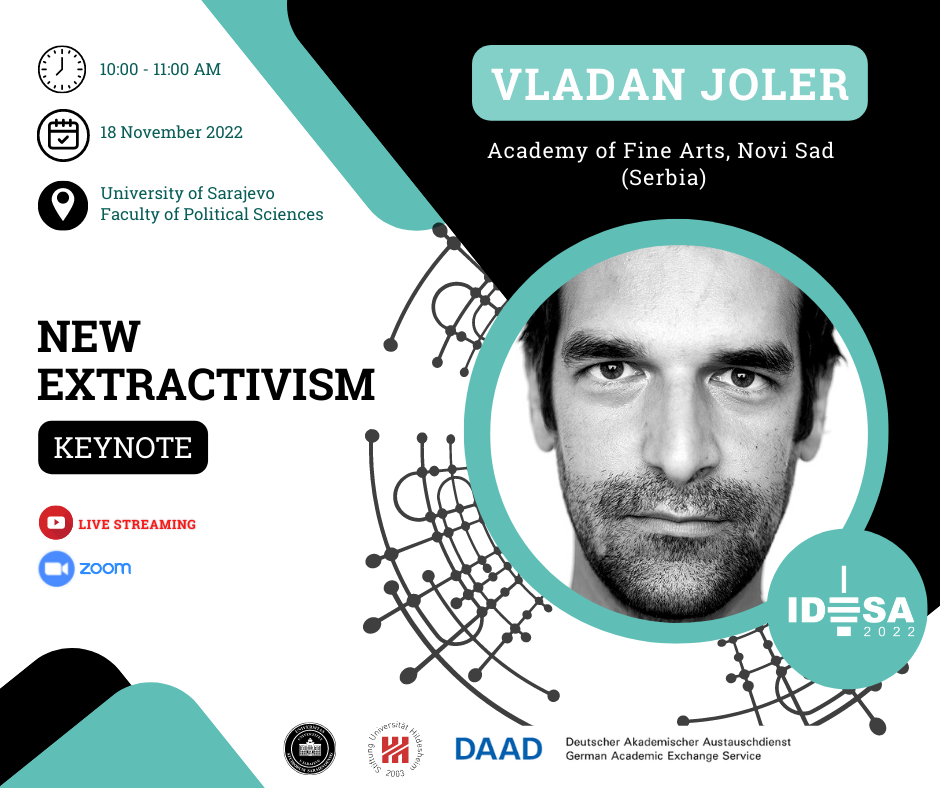 Vladan Joler was born in 1977 (Novi Sad) is SHARE Foundation co-founder and professor at the New Media department of the University of Novi Sad. He is leading SHARE Lab, a research and data investigation lab for exploring different technical and social aspects of algorithmic transparency, digital labour exploitation, invisible infrastructures, black boxes, and many other contemporary phenomena on the intersection between technology and society.
Vladan Joler was born in 1977 (Novi Sad) is SHARE Foundation co-founder and professor at the New Media department of the University of Novi Sad. He is leading SHARE Lab, a research and data investigation lab for exploring different technical and social aspects of algorithmic transparency, digital labour exploitation, invisible infrastructures, black boxes, and many other contemporary phenomena on the intersection between technology and society.
Vladan Joler’s work is included in the permanent collections of the Museum of Modern Art (MoMA) in New York City, the Victoria and Albert Museum, the Design Museum in London, and the permanent exhibition of the Ars Electronica Center in Linz. His work has been exhibited in more than a hundred international exhibitions, including institutions and events such as: ZKM, XXII Triennale di Milano, HKW, Vienna Biennale, V&A, transmediale, Ars Electronica, Biennale WRO, Design Society Shenzhen, Hyundai Motorstudio Beijing, MONA, Glassroom, La Gaite Lyrique, the Council of Europe in Strasbourg and the European Parliament in Brussels.
He has received numerous awards, including the 2019 Design of the Year Award by the Design Museum in London and the S+T+ARTS Prize ’19 Honorary Mention by the European Commission and Ars Electronica. He has given lectures at numerous educational and art institutions, including the University of Oxford, Museo Reina Sofía, CCCB, the Royal Academy of Arts in Copenhagen, HfG-Karlsruhe, MG+MSUM, Aarhus University, Somerset House, Hangar Barcelona, Mucem Marseille and numerous events such as Re:Publica, transmediale, Ars Electronica, The Influencers, CCC, etc. Joler’s work has been profiled and covered in many international media such as BBC, CNN, WIRED, The Independent, The Times, Wallpaper*, Le Figaro, The Verge, Fast Company, +ARCH, ArtForum, Neural, LesJours, WeMakeMoneyNotArt and many others.




